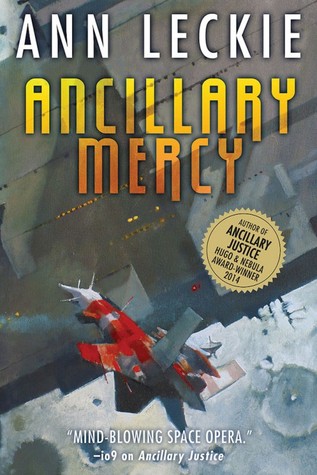Ancillary Mercy by Ann Leckie is the third and final book in the Imperial Radch series. It brings the saga of the ancillary of Justice of Toren to an end, but, as the novel says, there are no real endings. We'll have to wait and see if more books will be written in this universe to touch on some of the things left open.
Because this book is the third in the trilogy, my review includes some spoilers for the prior two books, but I avoid spoilers directly for this one. Read on for my full review.
Overall Impression
This is the third and final book in the Imperial Radch series by Ann Leckie. It's the story of how a ship artificial intelligence ended up in a single human body and fighting against the split ruler of all of humanity. The premise is grand, but the scope is small as the story in this novel takes place nearly entirely in Athoek System. The characters and setting have already been established and the plot is very similar in style to the prior novels, so if you enjoyed Ancillary Justice and Ancillary Sword, then you'll enjoy Ancillary Mercy.
Plot
A lot of the plot is deceptively slow. Most of the story is told through tense dialogs between different parties. It's quite interesting, but you eventually you realize you don't actually see a lot of the conflict directly until the later half of the book. This is an interesting style that works because of the nature of ancillaries; it still manages to keep the tension high and move the plot along. Near the end of the book you realize that quite a lot has happened, even if you didn't directly see it.
Characters
As the third book in the series, the characters are the same as the prior book with only a few additions. The main character is, as before, Breq Mianaai, formerly an ancillary of the ship Justice of Toren and now the Fleet Captain. Unfortunately, Breq has lost some of her personality compared to the prior two books. In the first, she was a unique and refreshing character (a singing ship), but now she seems more like a well-qualified leader that is a bit emotionally distant.
Some of the other characters remain the same, though Tisarwat and Seivarden grow and change a bit. Most notable is Station Athoek, which becomes far more proactive about taking care of herself and her citizens.
Setting / World Building
The novel takes place in the same universe established in the prior books and so there is not much new to present. Humanity is ruled by Anaander Mianaai, Lord of the Radch as it has been for thousands of years. Artificial intelligences, or AIs, control ships and stations either directly or through ancillaries. These AI are a main focus of the story. Beyond humans, there are a few alien civilizations, but the only one of note, and a major one in this book, is the Presger.
The Presger were a bit of a background presence in the prior novels, but become far more important in this novel. In Ancillary Sword, we saw the death of Translator Dlique. Here we see the arrival of Translator Dlique, though she's quickly convinced she's actually Translator Zeiat. The Presger are very odd and mysterious and half of what they say (like the above) doesn't make sense. In contrast to Liu Cixin's alien civilizations, which are similar to humans in their culture or sociology but dangerously advanced, Ann Leckie's aliens are utterly incomprehensible and also dangerously advanced. This makes them very interesting to read about and I hope Leckie revisits them in some future book.
Final Thoughts
This was another good book in the series, but not as strong or outstanding as the first. The characters are decent and the plot interesting, but there are a few minor, possibly stylistic, choices that lessened my enjoyment. The Presger aliens were very interesting and the implications of the conclusion were intriguing so it was still a worthwhile read.

No comments:
Post a Comment
Note: Only a member of this blog may post a comment.